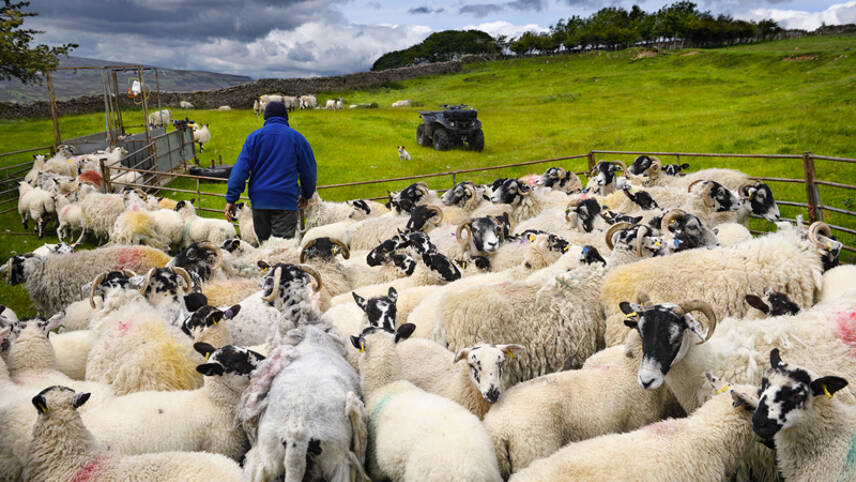Register for free and continue reading
Join our growing army of changemakers and get unlimited access to our premium content

Pictured: A sheep farmer in the Yorkshire Dales. Stock image.
Farmers will no longer be able to set more than a quarter of their land aside for certain nature-related activities and receive payments for doing so under the Sustainable Farming Incentive (SFI) scheme.
The scheme is part of a package of post-Brexit reforms to farmer pay that are intended to reward farmers for ‘public goods’ that contribute to the long-term sustainability of soils, landscapes and water – as well as for their food outputs.
The Department for the Environment, Food and Rural Affairs (Defra) stated today (25 March) that “a small number” of farms were entering large portions of their land into actions that take away from food production, and does not want this practice to proliferate.
It will limit the amount of land farmers can set aside for planting flowers, improving grasslands and setting down bird food.
These activities, Farming Minister Mark Spencer said, “were always intended to be implemented on smaller areas of land, and these changes will help to maintain this intention and continue our commitment to maintain domestic food production”.
The change builds on a Government commitment to begin publishing a new annual food security index, with the first edition due out this spring.
The index “will capture and present the key data needed to monitor how we are maintaining our current levels of food security across the country and is expected to be UK-wide”. Its aim is to ensure that the UK does not increase its reliance on imports for food security and to improve future forecasting.
The Energy and Climate Intelligence Unit’s (ECIU) land analyst Tom Lancaster said the change to the SFI announced today is sensible.
He said: “It ensures farmers can still generate a good income from these schemes, whilst making sure the budget goes further and allows more farmers to take part.”
“Green farming schemes are central to our food security. They support farmers to improve their soils, restore pollinators and tackle climate change, the biggest threat to food production in the UK.”
Previous ECIU research has revealed that costs resulting from climate challenges and from spiking fossil fuel prices in food supply chains added £700 to the average British household’s food bills in 2023.
Political acceptability doubtless plays into the decision the Government has taken this week. ‘No farmers, no food’ protests have been taking place across the UK and beyond in recent weeks, with some farmers seeing increased green regulation and legislation as another burden as they face issues such as high fertiliser and fuel costs, plus low farmgate prices.
Assurance body Red Tractor recently confirmed that it will drop its Greener Farms Commitment, an optional verification scheme for farmers to track and be recognised for their more environmentally friendly processes, due to pressure from trade unions. The change will take effect in April.
Related news: MPs press Defra for Land Use Framework


Please login or Register to leave a comment.